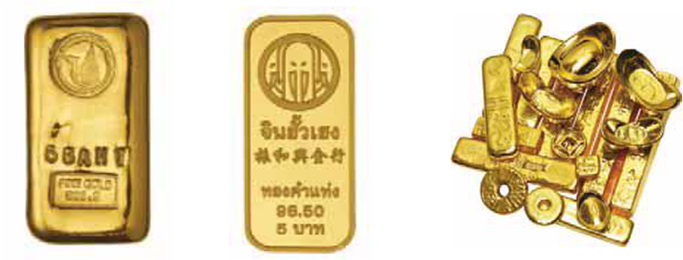Navigate
News List
MAS consultation paper on proposed amendments to the code on collective investment schemes
Read moreDespite global economic uncertainty, LBMA delegates see bright spot in the industry
Read moreSingapore has a strong framework to combat money laundering and terrorism financing, has more room to improve.
Read moreNews List
MAS consultation paper on proposed amendments to the code on collective investment schemes
Read moreDespite global economic uncertainty, LBMA delegates see bright spot in the industry
Read moreSingapore has a strong framework to combat money laundering and terrorism financing, has more room to improve.
Read moreThailand’s Gold Market
18 May 2017
Introduction
Physical gold is a popular asset in Asia, and this is no different in Thailand, the continent’s third-largest gold market after India and China. Locals use physical gold as an investment and as well as ornament, and the metal is a popular gift for newborns and for weddings.
In Thailand, the standard fineness of gold is 96.5% purity, commonly referred to as 23K, often bought in the form of jewellery, gold bars or coins. Baht is not only the local currency but also the standard gold unit, equivalent to 15.244 grams or 0.4901 troy ounces. Thai Gold is also measured in salung, which is a smaller unit when compared to baht, where 1 salung is 0.25 baht, or 3.81 grams.
Domestic Demand and Production
Metal Focus reported the total physical investment demand in Thailand in 2016 was 70 tonnes, and the same report shows that the Thai gold jewellery demand was 22 tonnes. The total consumer demand for gold was 92 tonnes. Additionally, the Bank of Thailand, the country’s central bank, holds 152.4 tonnes of gold in its official international reserves (IFS, January 2017).
There are nine gold bar manufacturers that are members of the Thai Gold Traders Association. They manufacture ordinary baht bars, traditional baht bars (biscuit, square, oval, round, rectangular, boat, and doughnut), and innovative bars with a purity of 96.5%, 23K as standard, and also 99.99% (24K).
Additionally, paper gold is available in Thailand, including the 50 Baht Gold Future contract (Ticker: GF) and ETFs, listed on the Stock Exchange of Thailand. Such market activities are well-supported by Thai Gold Traders Association members.
Gold Infrastructure
Gold shops and goldsmiths, estimated to number around 7,000 in Thailand, are found across the country, from large chains to family-run stores. Major companies in the gold sector include YLG Bullion International Co., MTS Gold Group, Ausiris, Hua Seng Heng, and MKS, the Swiss precious metals group. Umicore operates a precious metals refinery in Bangkok, which refines precious metals from recycled materials. Its output includes investment-grade fine gold bars.
In general, the import and export of gold are conducted by non-bank enterprises, which need to register with the Ministry of Commerce, Revenue Department and Customs Department. Besides registration, they also need to submit an FX report every quarter. These enterprises also have to be a member of the Thai Gold Traders Association, which is the representative body for the gold industry in the country.
All imports and exports of Gold is VAT exempt. VAT is 7% as at August 2016. Corporate tax is 25%.
Conclusion
Despite being overshadowed by the larger gold markets of China and India, Thailand boasts a developed and healthy gold market of its own, which is supported by strong domestic demand and well-developed trading and sales infrastructure. Thailand also has larger physical market activity than any of its regional neighbours, including Vietnam, Malaysia and Singapore. As its neighbouring countries have the potential to continue growing economically, the Thai gold market should have more room to grow.
Appendix
- Ministry of Commerce – https://www.moc.go.th/index.php/moc-english.html
- Revenue Department – http://www.rd.go.th/publish/index_eng.html
- Customs Department – http://en.customs.go.th/
- Central Bank of Thailand – https://www.bot.or.th/
- Ministry of Finance – http://www2.mof.go.th/
- Thai Gold Traders Association – http://www.goldtraders.or.th/
Currency Import and Export Restrictions
An importer may purchase or withdraw foreign currencies from their own foreign currency accounts for import payments upon submission of supporting documents. Letters of credit may also be issued without authorisation. By law, export proceeds of US$50,000 and above shall be repatriated immediately after payment is received and within 360 days from the export date. The proceeds must be sold to or deposited in a foreign currency account with an authorised bank in Thailand within 360 days of receipt.

Population: 67 million
GDP Growth: 0.9%
GDP/P: US$5,445
CPI: 1.9%
Exports: US$225 billion
Imports: US$200 billion
Foreign Reserves: US$157 billion (including gold)
Foreign Debt: US$140 billion
Source: FOCUSECONOMICS























